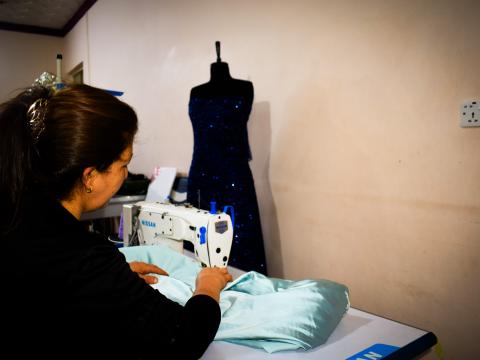Maisun restores her life after conflict and displacement

Like many people in Qaraqosh, it only took a moment for Maisun’s and her family’s life to change forever. It was the moment they hurried hastily carrying their basic necessities leaving their home fearing for their lives. They had already heard from the news about the start of the conflict in Sinjar and Mosul, but, after a while, sudden attacks started in their town of Qaraqosh that is 31.8 km away from Mosul and 66.5 km distance to Kurdistan Region of Iraq.
On normal days, a drive from Qaraqosh to Kurdistan Region of Iraq would take only an hour, but on that rather gloomy day, it took Maisun and her family of twelve people six to seven hours' drive to get to Shaqlawa, a mountainous town in the northern part of Kurdistan Region of Iraq.
Before the conflict, the financial situation of Maisun and her family was very good. They were enjoying a normal, simple, and stable life. Her husband and her two brothers-in-law were running a car maintenance shop. During those days before the conflict, Maisun loved sewing. She shared, “My hobby was sewing. Sewing needs talent, and I was doing it as a hobby and not for making money. So when I would make a piece and it turned out beautiful, my passion would grow for this hobby and my clients would be happy also. My paternal family had a sewing machine. When I got married, my in-laws also had a sewing machine. But then I bought a new machine and when I had just managed to sew two dresses, the conflict started.”
In the haste of leaving her home in Qaraqosh, she forgot her new machine behind and hurried to gain safety. Living in displacement took a great toll on Maisun and her family. They were drained emotionally and financially. Maisun reflected on those days, “Before the conflict of 2014, our life was very good. But during displacement, we were left out of everything. We couldn’t stay in the camps because my in-laws were old in age and they couldn’t stay in such places. So we had to rent a house. We rented a house for three months in Shaqlawa. But there were no job opportunities there and we were all unemployed. So we went to Erbil city, and then settled in Ainkawa for a year until we returned to Qaraqosh. In Ainkawa we lived in rentals throughout the whole period. The money we had was spent on rentals and daily expenses. We were twelve people living in one rental house.” She continued, “We went from a stable life into a threatened life of instability.”
As the conflict ended, Maisun and her family returned to Qaraqosh where they started to get aid from organisations and churches, slowly rebuilding their lives.
Today Maisun is forty-eight and has two sons and one daughter. Her eldest son is studying at university, her daughter is studying at the institute, and her youngest one is in the last year of high school. Maisun is still living with her own family and in-laws in one house. Her husband and brothers-in-law returned to their past profession of car maintenance. Maisun has not quit sewing. In fact, she brought a sewing machine she received from charitable organisations while she lived in Ainkawa during displacement. Her old clients, who returned to the city of Qaraqosh, are visiting her again and making orders for dresses.
Maisun recently took part in a project that is an Australian Aid Initiative implemented by World Vision Iraq on behalf of the Australian Government. Through this project, Maisun was trained in business development and in sewing. In addition, she received a grant that helped her buy supplies and equipment for her little atelier inside her home.
Maisun shared, “The participation in the business development training was good. We took part in business management in Mosul and a sewing course for five days. The items they brought to me, of course helped me advance in my work. There was a real progress as I benefited from the items I received from the grant. Before, I would have spent from my pocket, but now, I can spend from the grant I received.”
Today, despite everything that Maisun went through, she continues to have dreams. She shared, “I dream of always being distinctive. I don’t like mediocrity. I like to do things in special ways and to have make a name for myself.”
Through the Safe Returns Project, thirty-five women and five men were trained in business development. Five hundred beneficiaries participated in savings group and forty beneficiaries received grants to develop small projects.
After the conflict, Maisun and her family had to start from scratch. Through projects like this, World Vision Iraq aims to help strengthen the business development skills of heads of households. The project will reach 1,260 households (7,560 individuals) in post-conflict affected areas in Hamdaniyah and Mosul.